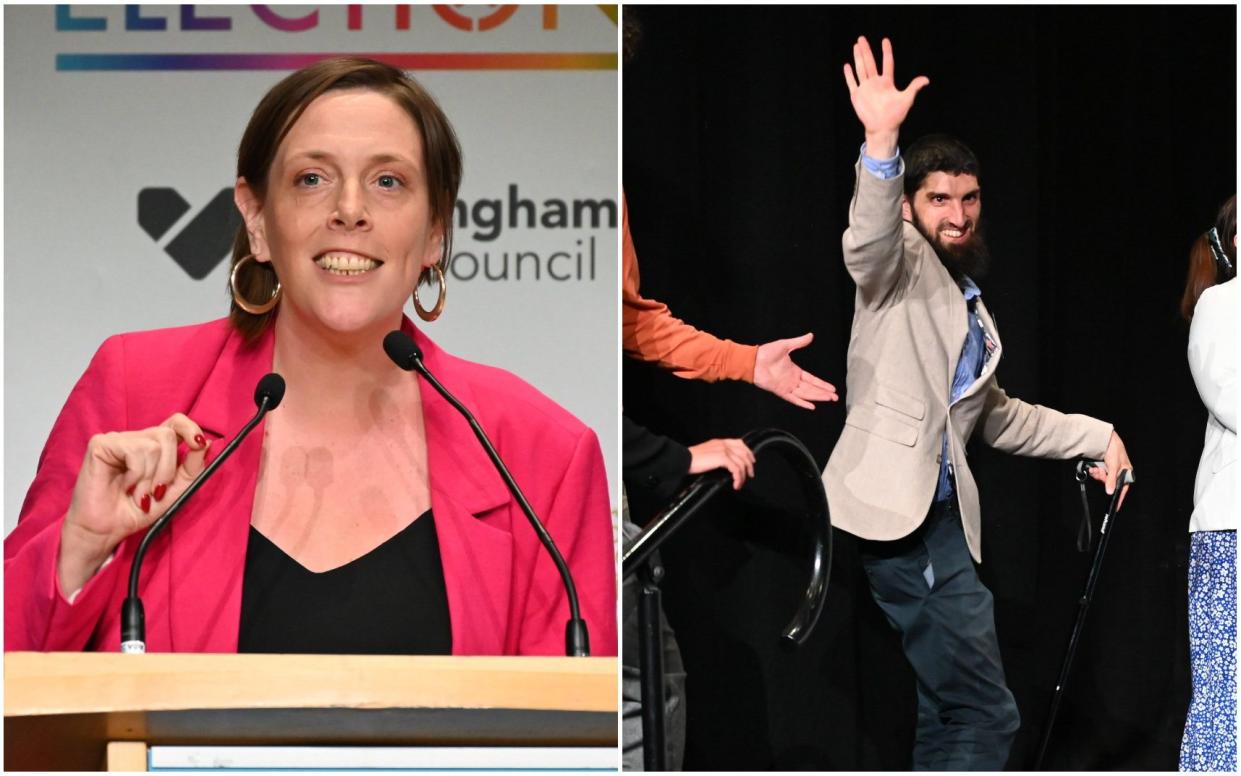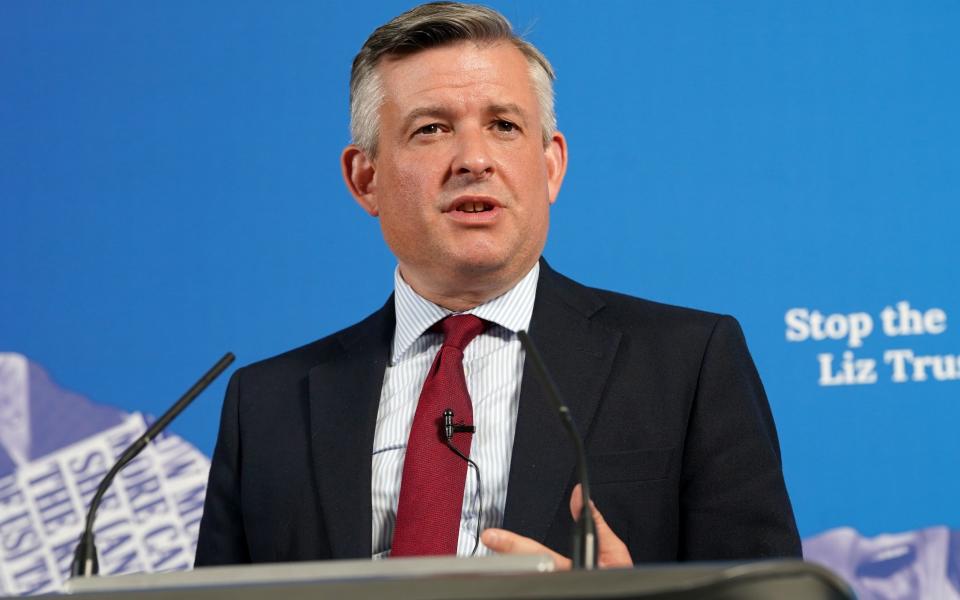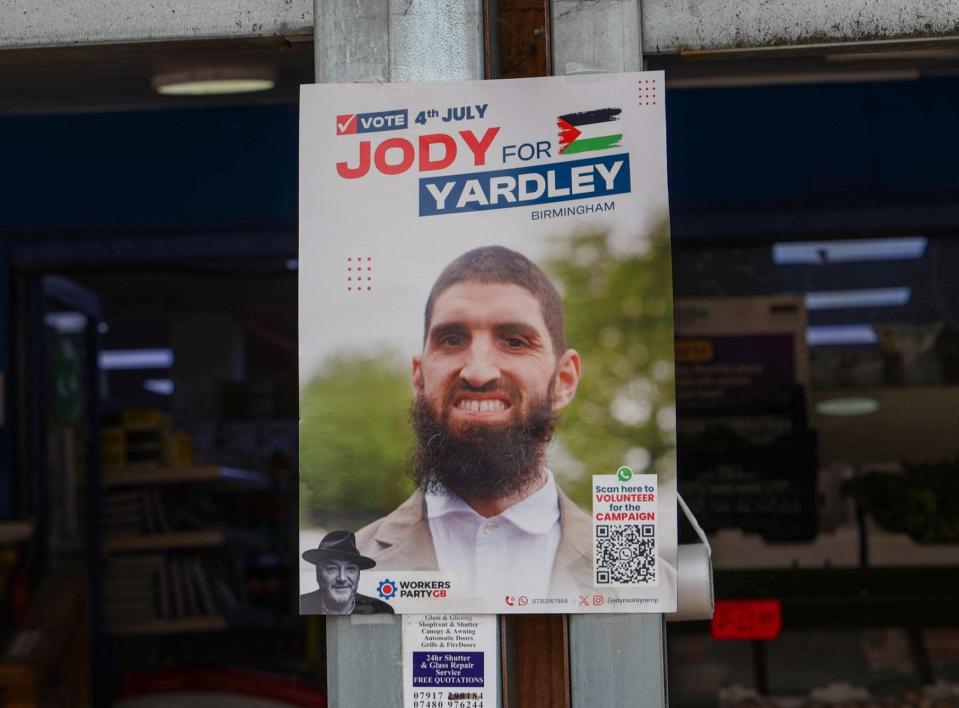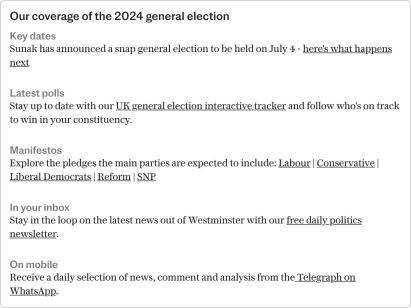The terrifying pro-Palestine campaign that hurt Labour – and threatens democracy

- Oops!Something went wrong.Please try again later.
- Oops!Something went wrong.Please try again later.
Along Birmingham’s busy main roads the day after the general election, Palestinian flags flutter from lamp-posts as traffic roars past. A sign near a major roundabout reads: “Vote for genocide. Vote Labour.”
In the event, many of those in the city who might have otherwise supported Sir Keir Starmer’s winning party voted for alternative candidates instead.
In Jess Phillips’s Birmingham Yardley constituency, Amaan Hussain, 18, voted not for Phillips but Jody McIntyre, who stood for George Galloway’s Workers Party. “Because,” he explains, “Starmer doesn’t support Palestine.”

Although Phillips herself quit the Labour frontbench to vote for a ceasefire in Gaza last year, Labour’s position on the Middle East conflict – initially calling for a “pause” in fighting before finally backing an “immediate humanitarian ceasefire” in February – has cost her dearly. In what she described as “the worst election I have ever stood in”, she saw her majority dwindle from 13,141 to just 693. McIntrye came second, with 10,582 votes.
On the streets of the local area, there are plenty who say they would have given Phillips their vote if it hadn’t been for Gaza. “If Labour supported Palestine, everyone I know who voted for the Workers Party would have voted Labour,” says Hussain, who has just finished college. “Everyone I know voted Workers because of it.”
But the backlash didn’t stop at denying votes to Phillips. During an angry victory speech, the 42-year-old MP was heckled. Speaking of the intimidation and harassment her campaign team had suffered in the past weeks, she recounted how a community activist canvassing with her was filmed by people in the streets and had her car’s tyres slashed. “A young woman on her own delivering leaflets was filmed and screamed at by a much older man in the street,” she said, thanking West Midlands Police for taking “constant” phone calls from her.
Cries of “free Palestine” and “shame on you” rang out as the result was announced. “I will carry on with my speech,” said a steely Phillips. “I understand that a strong woman standing up to you is met with such reticence.”
The graffiti-covered shutters on her constituency office are down when I visit on July 5. But two men working in a nearby minimarket are scornful of her claims. They accuse her of “playing the victim” and insist “there was nothing going on”. Neither of these men voted, they say, but the bitterness of the divide that has emerged is evident in their response to Phillips’s words.
Outside the shop is pinned a “Jody for Yardley Birmingham” poster, featuring a picture of McIntyre and a Palestinian flag.
It was not only Phillips who complained about intimidation, but also another of the city’s female MPs, Shabana Mahmood. She won in Birmingham Ladywood with a majority of 3,421 – down from 32,000 after independent candidate Akhmed Yakoob stood against her and won 12,137 votes.
Like McIntyre, Yakoob had campaigned on a pro-Palestine ticket. In Mahmood’s speech, she told of what she and her family had been subjected to during the campaign.
“This was a campaign that was sullied by harassment and intimidation,” she said, branding the behaviour “an assault on democracy itself” and declaring: “British politics must soon wake up to what happened at this election.”
Indeed, this is not just a Birmingham issue. The reverberations of Labour’s response to the Gaza conflict were seen far beyond the city. In seats where more than 10 per cent of the population identify as Muslim, the party’s vote was down by 11 points on average. A shock result in Leicester South saw shadow minister Jonathan Ashworth, who had a majority of more than 22,000, lose his seat to independent candidate Shockat Adam. “This is for Gaza,” Adam declared when he won by 979 votes.

In Ilford North, Labour’s Wes Streeting only just scraped a win after his majority was cut from more than 9,000 to just 528.
Labour had been alive to the possibility that its stance on Gaza had dented its support in Muslim areas. During the campaign, it sent extra activists to seats that were vulnerable for this reason. But it likely didn’t foresee just how dramatic the fallout over Gaza would be.
Meanwhile, a group called The Muslim Vote was busy during the campaign trying to change the conversation, by helping Muslims decide who to back and whether a local independent should stand in particular areas. “We are a powerful, united force of four million acting in unison,” says its mission statement.
Hinting that Labour will have to contend for some time with this new force now mobilised in British politics, the organisation, which is supported by two groups set to be investigated over extremism fears, says: “We are here for the long term. In 2024, we will lay the foundations for our community’s political future.”
So what would Starmer’s party have to do to win back support among those turned off by its perceived failure to stand with the Palestinians against Israel?
“Labour would have to go on air saying they support Palestine,” says Hussain.
A 42-year-old telecoms worker in Birmingham Yardley, who also voted for McIntyre but doesn’t want to give his name, says it’s not only Muslims who have been turned off. “Anyone with a conscience should be against [Starmer],” he says.

He believes this has been an election in which “the elite” has caused divisions “between brown, black and white people” with their comments. He cites remarks made by Starmer late on in the campaign, about how “at the moment people coming from countries like Bangladesh are not being removed.”
Though Starmer subsequently explained his remarks (adding: “I certainly wasn’t intending to cause any concern or offence”), the telecoms worker says: “He didn’t need to single out that community.”
But this is secondary to disappointment – which extends beyond Muslim communities – with Labour over the war in Gaza. Perhaps not since the Iraq War has a foreign conflict had such a profound effect on domestic British politics. When the dust settles on Labour’s victory, there will be further reflection on how the party has lost so much support among those who would once have naturally backed them.
Those who deserted the party this time may want to see Labour recognise an independent Palestinian state in advance of any formal peace deal in the Middle East, and impose an embargo on arms sales to Israel. Some Labour MPs already know this all too well.
Zarah Sultana, the Labour MP for Coventry South, told the BBC Radio 4 Today programme her party was “out of touch.” She said: “On the one hand we’re saying we need to listen to voters, but when it comes to this particular issue there was a hope that this problem would just go away and it hasn’t. The party has to seriously recognise and acknowledge the issue.”
It will need to find ways to win back those like Zulfiqar Muhammed, a 31-year-old trainee solicitor, who has voted Labour in every election until now. Leaving the Sirajam Muneera Jamia Masjid mosque in the early afternoon, Muhammed says he voted for McIntyre after Starmer’s unappealing stance on Gaza put him off. What would Labour need to do to win back his support?
“Fight for their people,” he says.


